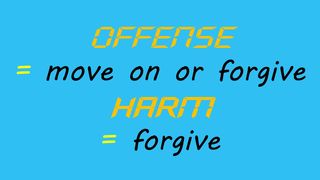Forgiveness
What Is the Difference Between Being Offended and Harmed?
Seeing the difference between being offended and harmed might reduce resentment.
Posted July 6, 2018
I credit the author Lou Marinoff (1999) with the important idea that our being offended by others is not the same as being harmed by them. So often, when we are insulted, disrespected, ignored, or treated in an uncivil way, we get angry. That anger can stay in us for weeks, then grow so large as to disquiet us inside. It is at that point that some people consider forgiving those who are holding this kind of power over them.
Yet, Dr. Marinoff, a philosopher, has me now wondering: Sometimes we may not need to take the step of forgiveness if we first ask ourselves this: Have I been harmed by what happened? Harm here is meant as something concrete in this world, something tangible, something that not just hurts inside but is destructive outside.
A punch in the face that bruises or breaks a bone is harm.
A destroyed reputation that prevents someone from finding a good job is harm.
Being arrested on false charges is harm.
Having one's feelings hurt without any physical contact at all is an offense, not necessarily harm.
Being told in private that one needs to work harder, which deeply embarrasses but does not jeopardize the job, is an offense, not harm.
Being falsely accused by someone with no legal power and with no repercussions at all is an offense, not harm.

Sometimes we need to make this distinction between being offended and being harmed. The legal profession does just that. As one lawyer explained to me, we do not have a legal right not to be offended by others.
When we make this distinction between offense and harm, the inner rage can quiet if we realize: The person hurt my feelings, but did absolutely no actual harm to me. Do I really need to carry around this kind of inner burden? Who is being hurt by my carrying all of this around: the one who made the insensitive remark or me? The answer may help the questioner to let the issue go and to move on without carrying the resentment which, if deep and long lasting enough, could lead to a lack of confidence and even anxiety or psychological depression.

At the same time, people can fall into inner traps where the offense itself leads to such inner turmoil that forgiveness is an important step in emotional release and a return to emotional health. Not all offenses, recognized as not harmful, can be easily dismissed and so the option of forgiving needs to be present. Yet, for many people, when they step back from the inner conversation and realize that no harm was done, this insight alone can be healing. To move on and to forgive are quite different. One can move on by putting the situation behind without carrying resentment toward the one who offended. To forgive is to strive to offer goodness toward those who are not good to the offender. Forgiveness requires work in reducing resentment, on bearing pain, and on exercising the virtues of civility, respect, and eventually even love in place of annoyance, resentment, and even hatred.
So, then, have you been offended by someone? What harm has been concretely done to you? If none, are you able to move on? If not, then forgiveness may be in order. If you have been harmed, forgiveness may be just the order you need to reestablish emotional well-being.
References
Marinoff, L. (1999). Plato, not Prozac. Pymble, Australia: HarperCollins.


